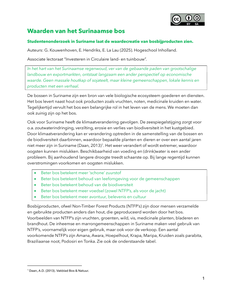In het Surinaamse regenwoud ligt een groot potentieel voor duurzame waardecreatie via non-timber forest products (NTFP’s) – bosproducten zoals vruchten, kruiden, oliën en zelfs toeristische diensten. Studenten van Hogeschool Inholland onderzochten samen met Surinaamse partners hoe deze producten bijdragen aan ecologische, economische en sociaal-culturele waarde. NTFP’s zijn cruciaal voor het levensonderhoud van inheemse en marrongemeenschappen. Ze leveren voeding, medicijnen en inkomsten. Echter, de sector kampt met uitdagingen: overharvesting, gebrek aan ketenregie, beperkte lokale verwerking en infrastructuur, en een fragiele institutionele context. Studenten ontdekten dat veel waardevolle producten onbenut blijven, of zonder toegevoegde waarde de markt op gaan. Ondertussen verdwijnen traditionele kennis en biodiversiteit door gebrekkig beheer. Het onderzoek richtte zich op kansen voor meervoudige waardecreatie. Voorbeelden zijn duurzame voedselproducten voor diaspora-doelgroepen, community-based toerisme en circulaire non-food innovaties zoals zeep. Initiatieven zoals in Bigi Poika en Cassipora laten zien hoe ondernemerschap, cultuur en natuur samen kunnen floreren. Cruciaal daarbij is samenwerking: tussen lokale gemeenschappen, overheden, onderwijs en ondernemers – ook wel de ‘triple helix’. Belangrijk inzicht: het bos is geen voorraadkast, maar een levend ecosysteem. Verantwoorde benutting van NTFP’s vereist beheerplannen, kennisdeling, certificering en infrastructuur. Praktijkgericht onderzoek en co-creatie – onder andere in het Living Lab JSOOC – vormen de sleutel tot duurzame ontwikkeling. Het project toonde aan dat studenten met Surinaamse roots een unieke brugfunctie vervullen tussen culturen. Zij brengen kennis, identiteit en innovatie samen in een gezamenlijke missie: waarde creëren met én voor het Surinaamse bos.
DOCUMENT

In the troubled times in which we currently live, the tourism industry has called into question a need for more responsible social practices and more mindful utilisation of natural environments. The Japanese practice of shinrin-yoku, or forest bathing, has not only become a new wellness trend, but also a great potential for deeply immersive tourist experiences. While there is a wealth of studies examining the positive effects of forest bathing focussing principally on its medical benefits, this qualitative study extends these debates through documenting lived experiences of forest bathers. In so doing forest bathing suggests its latent potential to offer a profoundly mindful experience, and aims to situate this practice more prominently within the tourism discourse.
MULTIFILE
Through the commodification of nature, the framing of the environment as a ‘natural resource’ or ‘ecosystem service’ has become increasingly prominent in international environmental governance. The economic capture approach is promoted by international organizations such as the United Nations Environmental Program (UNEP) through Reducing Emissions from Deforestation and Forest Degradation (REDD), Payments for Ecosystem Services (PES) and The Economics of Ecosystems and Biodiversity (TEEB). This paper will inquire as to how forest protection is related to issues of social and ecological justice, exploring whether forest exploitation based on the top-down managerial model fosters an unequitable distribution of resources. Both top-down and community-based approaches to forest protection will be critically examined and a more inclusive ethical framework to forest protection will be offered. The findings of this examination indicate the need for a renewed focus on existing examples of good practice in addressing both social and ecological need, as well as the necessity to address the less comfortable problem of where compromise appears less possible. The conclusion argues for the need to consider ecological justice as an important aspect of more socially orientated environmental justice for forest protection. https://doi.org/10.1017/S0376892916000436 https://www.linkedin.com/in/helenkopnina/
MULTIFILE
